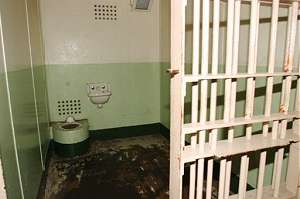In 2001, a few days before the Sept. 11 attacks, a German engineering student named Said Bahaji unexpectedly announced to his family he had a job waiting for him at a Pakistani computer company and he flew to Karachi, leaving behind his wife and infant son.
In the aftermath of the attacks, Mr. Bahaji, the Muslim son of a German mother and Moroccan father, was found to have rented and shared an apartment with two suspected World Trade Center hijackers, including Mohammed Atta, the believed ringleader, and a third Arab man who tried to take flying lessons in the United States. Little had been heard from Mr. Bahaji since then until this week, when a German passport believed to be his was recovered by Pakistani troops in an abandoned militant compound.
Pakistani authorities suspect Mr. Bahaji is one of the al Qeada leaders helping the Taliban fight government forces in the rugged South Waziristan region.
U.S. and German investigators believe he helped the Hamburg based terrorists with logistics like obtaining travel documents and setting up computers.
Even before Sept. 11, 2001, German authorities thought Mr. Bahaji was up to something. Born in Germany, he spent most of his youth on his father's family's large farming estate in northern Morocco. He returned to Germany in 1996 to attend a technical university in Harburg, a working-class suburb of Hamburg.
At that time, Mr. Bahaji held moderate beliefs, and even had a love affair with a Catholic woman he met in a year-long preparatory program for foreign students, according to close relatives who spoke to The Wall Street Journal. Heartbroken when it ended, he sought solace in Islam and at al-Quds, a Hamburg mosque frequented by extremists, these relatives said.
There he got to know Mamoun Darkazanli, a Syrian merchant who shared a bank account with a man believed to have masterminded the 1998 bombings of two U.S. embassies in Africa. Because of his association with Mr. Darkazanli, Mr. Bahaji was watched for a time by German police.
What they saw seemed like a normal student. Called for military service, Mr. Bahaji moved out of student dorm and in November 1998 rented an apartment with Mr. Atta and Ramzi Binalshibh, the Yemeni whose efforts to take flying lessons in the U.S. were foiled when he was denied a visa. Mr. Binalshibh was eventually captured and has been held since then at Guantanamo Bay.
A part-time resident of the apartment Mr. Bahaji rented was Marwan Al-Shehhi, the suspected pilot of the second plane to hit the World Trade Center.
In August 1999 Mr. Bahaji he moved out of the apartment and in October married Nese Kul, an 18-year old he met through her stepfather, Ibrahim Scholz, a German convert to Islam. The wedding at al-Quds was attended by many university friends, including Messrs. Atta, Al-Shehhi, Binalshibh and Darkazanli. A year and a half later, Ms. Bahaji gave birth to a son, Omar, who has the dark eyes and hair of his father, relatives said.
Family members said Mr. Bahaji was thrilled to be a father, but three months later he sent an email to his mother saying he would probably have to go away an unexpected "internship" to complete his degree, perhaps as soon as Aug. 20 and perhaps even abroad, "if God wills it."
On Sept. 2, 2001, Mr. Bahaji's sister Maryam, Mr. Scholz, and Nese Bahaji's mother Aise gathered at the cramped Bunatwiete apartment to wish him off. The following day, Mr. Scholz drove Mr. Bahaji to the airport and he boarded the plane, investigators now know, with two men traveling with false identities.
Within hours after the World Trade Center collapsed, investigators spotted the link between Mr. Atta and Mr. Bahaji. At 2 a.m. on Sept. 12, German police raided into Mr. Bahaji's Harburg apartment. Letters and phone calls from Mr. Bahaji to his mother and other relatives have been intercepted by authorities. He last called his mother, Anneliese Bahaji, in 2007, according to people familiar with the evidence German authorities have gathered. |
 BERLIN, July 14 -- German prosecutors said Friday that they had closed their investigation of a German Syrian businessman accused in Spain of being a key al-Qaeda figure. Federal prosecutors said their investigation had failed to confirm suspicions that Mamoun Darkazanli "founded, along with other people, an organization in Germany with the aim of giving logistical and financial support to the terrorist aims of the international network of violent Islamists."
BERLIN, July 14 -- German prosecutors said Friday that they had closed their investigation of a German Syrian businessman accused in Spain of being a key al-Qaeda figure. Federal prosecutors said their investigation had failed to confirm suspicions that Mamoun Darkazanli "founded, along with other people, an organization in Germany with the aim of giving logistical and financial support to the terrorist aims of the international network of violent Islamists."
 Germany on Monday freed a suspected al-Qaeda financier after the country's highest court ruled that the European legislation needed to extradite him was unconstitutional. The ruling on the implementation of the European arrest warrant, one of the European Union's chief tools in the fight against terrorism, threatens to delay extraditions to and from Germany, the centre of many high-profile terror cases.
Germany on Monday freed a suspected al-Qaeda financier after the country's highest court ruled that the European legislation needed to extradite him was unconstitutional. The ruling on the implementation of the European arrest warrant, one of the European Union's chief tools in the fight against terrorism, threatens to delay extraditions to and from Germany, the centre of many high-profile terror cases. A Syrian-born German who is accused of being Osama bin Laden's business associate in Germany lost a second appeal on Monday against extradition to Spain to face grave terrorism charges.
A Syrian-born German who is accused of being Osama bin Laden's business associate in Germany lost a second appeal on Monday against extradition to Spain to face grave terrorism charges.  Germany's highest court overturned an extradition order against a suspected senior Al-Qaeda member,
Germany's highest court overturned an extradition order against a suspected senior Al-Qaeda member,